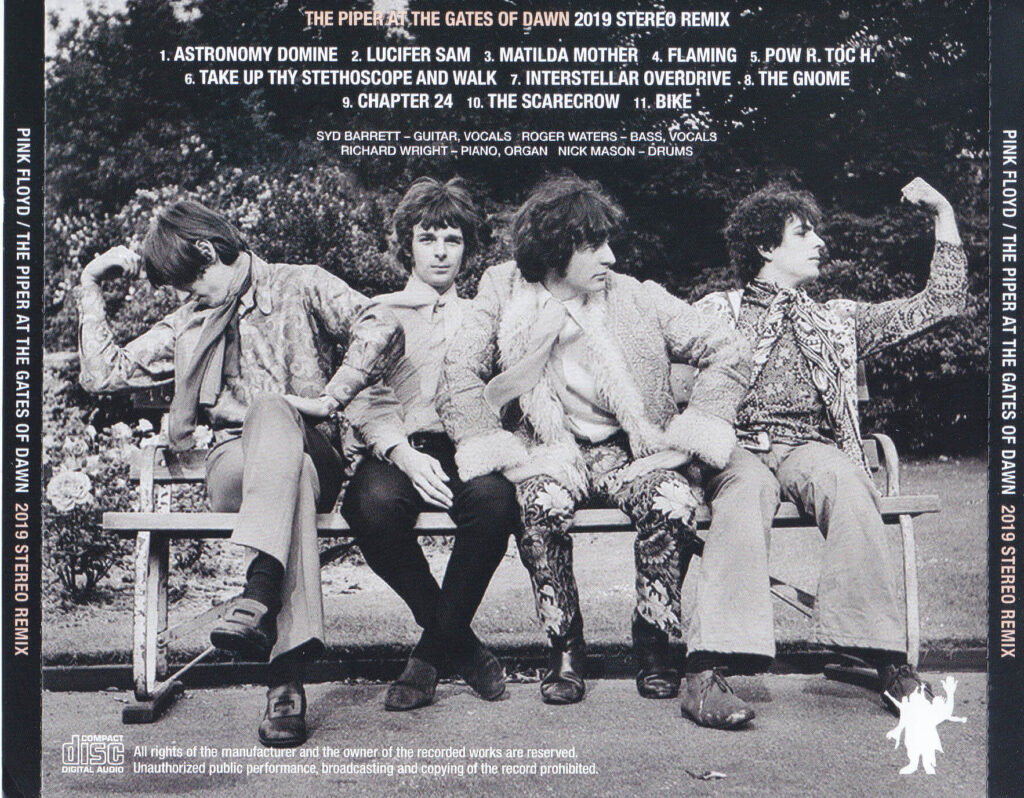8/4/1967: It was 55 years ago, today. With any discussion of 1967 (in general) and The Summer of Love (in particular) Sgt. Pepper soaks up so much (oh so much) of the oxygen it’s easy to overlook the TONNAGE of debut rock album genius that dropped (The Doors, Hendrix, Captain Beefheart, Velvet Underground) as well as Love’s Forever Changes, Disraeli Gears, Moby Grape, The Who Sell Out, Easter Everywhere (hello 13th Floor Elevators), The Kinks Something Else, etc……
But an album that never gets nearly enough love or attention is Pink Floyd’s still-impossible-to-fathom splash of psychedelic bliss, Piper at the Gates of Dawn. Check it out:
Floyd, with Syd Barrett’s replacement, went on to own the ’70s and drop a succession of masterpieces, but Piper is all Barrett and all-time: from the echoed cadence of roll-called planets to those last surreal goose honks, Syd Barrett’s guided tour through the miniature landscapes and dreamscapes he was imagining does transport you to other places, but also another time: youth. Everything about the execution, and realization, of this spectacular album exudes the uncorrupted innocence of a novel conception. More inspiration than insanity, Barrett’s acid-inspired reveries unlocked the obvious genius teeming inside his head. The Piper at the Gates of Dawn is an enduring and ever-relevant document of unbridled and ecstatic creativity realizing its initial and immediate fulfillment, a full-flowering burst that would not (could not?) be duplicated.
“For all the time spent in that room
The doll’s house, darkness, old perfume
And fairy stories held me high on
Clouds of sunlight floating by…”
It is possible that The Piper at the Gates of Dawn was such a fully-realized burst of sui generis psychedelia that it could never be equaled or imitated. Following the success of the singles “Arnold Layne” and “See Emily Play” the band (then known as The Pink Floyd) set up shop at Abbey Road Studios, across the hall from the Fab Four, who were assembling Sgt. Pepper.
The results, remarkable in and of themselves, assume an added layer of relevance when considered as primarily the result of one man’s singular vision (as opposed to the Four Fabs, or five if you count George Martin—and you should): anyone who wants to more fully understand Pink Floyd, 1967, psychedelic rock, and one of the more consistently satisfying debut albums ever is obliged to acquire The Piper at the Gates of Dawn.
Oh, by the way, this one’s Pink. With due respect to Waters, Wright, and Mason, the band’s first effort was Barrett’s baby. His lyrics, ranging from the obligatory astral imagery of the era (“Astronomy Domine”) to the obligatory shout-out to I Ching (“Chapter 24”) to the brain salad surgery of “Bike”, reveal an erudite and eccentric wordsmith, more light than dark, more ebullient than enigmatic. Piper, in short, is a happy explosion of creative potential, producing fruit that flourishes more than 40 years on. And intriguing as Barrett’s words and voice are throughout, the real revelation is his songwriting.
The compositions, with the notable exception of the extended space-rock jam “Interstellar Overdrive”, are exercises in precision, packing maximal sound and feeling into bite-sized bits. Barrett’s clever if unconventional use of a Zippo lighter as a makeshift slide gave him the ability to play fast while conjuring a shrill metallic shriek from his guitar. Those glistening cries are in full effect on the single “Apples and Oranges”, adding just enough quirky edge to give it the signature Floyd sound (that, and the “quack quack” after the line “feeding ducks in the afternoon tide”—a classic Barrett embellishment).
Considering Piper and the handful of singles and outtakes, one could make a reasonable case that Barrett’s diamond shined as bright as any artist’s in 1967. (And beyond: Although not included in this set, consider the fey, teasing vocal performance on “Candy and a Currant Bun”—formerly “Let’s Roll Another One”, a title the band was obliged to change for obvious reasons—which is worth noting for the template it provided the young David Bowie.) The world had every reason to think that Pink Floyd was going to make game-changing music and be around for a long, long time. As we know, they did, and were; albeit without their front man, who was asked to leave the band less than a year after Piper was released. It was unbelievable then, and remains difficult to completely comprehend now.
(A lot more on Floyd HERE, HERE, HERE, and HERE.)

